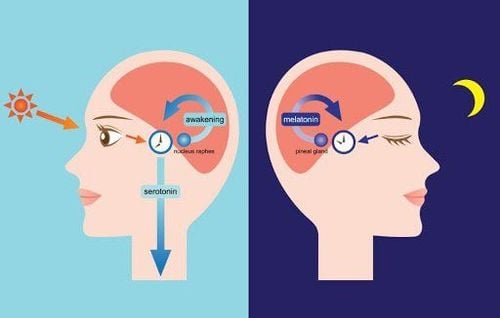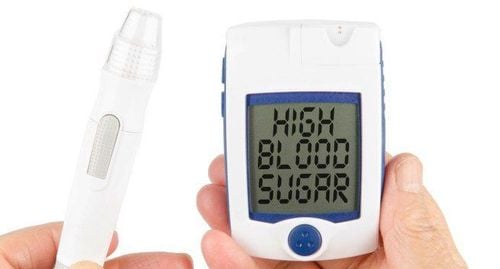This is an automatically translated article.
The circadian rhythm or body clock plays an important role in many processes such as sleep-wake cycles, hormone secretion, cardiovascular health, homeostasis and body temperature regulation. Melatonin is an important hormone in circadian clock synchronization.
1. What is circadian rhythm?
Circadian rhythm is a series of bodily functions that are regulated by the body's internal biological clock to control cycles such as sleep and wakefulness, body temperature, hormone secretion...
The body maintains circadian rhythms through a variety of hormones that respond to the body. Exposure to light, eating habits, and other environmental influences can maintain or disrupt circadian rhythms. Disrupting circadian rhythms can lead to serious health problems.
Energy balance is also one of the most important foundations of metabolism, on the contrary, energy imbalance is associated with many diseases such as obesity, diabetes, cardiovascular disease. Body clock affects and regulates metabolism and energy balance
2. How does circadian rhythm work?
The circadian rhythm is maintained by the activity of the circadian clock located in the superior optic nerve nucleus (SCN), in the hypothalamus inside the brain. The SCN sends signals throughout the day to regulate your body's activity.
Most circadian rhythms work on a 24-hour cycle. In addition, there are diurnal circadian rhythms, short circadian rhythms under 24 hours, circadian rhythms by month or by year. The 24-hour circadian clock that controls functions like sleep, body temperature and hormonal changes is most affected by light. During the day, when exposed to light, the SNC sends an alert signal to tell your body it's time to wake up. When the sun goes down, the SNC signals the production of melatonin, a hormone that causes sleep. It then continues to signal your body to sleep.
In addition to sleep, the circadian rhythm affects important functions such as metabolism, heart rate, blood pressure, body temperature, hormone levels, urine production. Circadian rhythms are also tied to blood sugar and cholesterol regulation, mental health-related risks leading to depression, bipolar disorder, and neurodegenerative diseases. Circadian rhythms also affect your immune system, DNA repair, and the effectiveness of cancer treatments. Other factors that affect your body clock are exercise, hormones, and any medications you may be taking.

Nhịp sinh học được hoạt động với chu kỳ 24 giờ ảnh hưởng tới các cơ quan trong cơ thể
3. Which hormone is responsible for the body's circadian rhythms?
There are many hormones involved in regulating the body's biological clock. Leptin is a hormone released from fat cells that has specific receptors on the hypothalamus. This hormone plays a role in the regulation of energy metabolism by activating the sympathetic nervous system and increasing thermogenesis by increasing thyroid hormone. The release of the hormone leptin occurs in a circadian rhythm, and serum leptin levels peak at night. Thus, disruption of the circadian balance can indirectly affect leptin secretion, thermogenesis, homeostasis as well as energy metabolism. Growth hormone (GH) is a hormone released from the hypothalamus that is more active at night. Growth hormone levels are highest between 2am and 4am. If the link between circadian rhythms and growth hormone secretion is disrupted by a sleep disturbance, growth hormone levels cannot be released at normal levels. Therefore, it will affect the growth and development process, especially in children. Cortisol is a steroid hormone secreted by the adrenal gland that helps regulate many of the metabolism of sugars, proteins, and fats. The amount and frequency of cortisol secretion is regulated through circadian rhythms. Circulatory cortisol levels are highest in the morning just before waking up. Cortisol decreases gradually during the day, reaching its lowest level during sleep after midnight. Cortisol is the main hormone that regulates metabolism in the body, increasing the utilization of glucose, amino acids and free fatty acids from endogenous reserves. Therefore, high levels of cortisol act as a catabolic hormone that reduces muscle mass and makes the body lean, while increasing energy expenditure. In addition, glucose tolerance and insulin secretion also change during the day. During metabolism, both insulin sensitivity and insulin secretion are reduced at night (especially between 3 am and 5 am) compared with the morning. This metabolism highlights the impact of the circadian clock on glucose metabolism. During the body's natural physiological process, hormones act as antagonists to insulin (especially growth hormone) to return blood sugar to normal. This counteracts physiological insulin secretion in non-diabetic or non-insulin dependent individuals. Conversely, when insulin release is disturbed, the effect of growth hormone secreted at night is reduced, especially in diabetic patients. This leads to an increase in blood sugar in the morning regardless of the way you eat.
Melatonin is an important hormone in circadian clock synchronization. This hormone is involved in many biological and physiological processes in the body. Melatonin is a hormone that is effective for human circadian rhythms. The main role of this hormone is to maintain the circadian clock and regulate body rhythms. The synthesis and release of melatonin is at night and is inhibited by light during the day. Especially between 11 p.m. and 5 a.m., melatonin secretion peaks and blood levels increase 3–10 times. However, exposure to light at night causes plasma melatonin levels to drop. In summary, the circadian rhythm has a bidirectional interaction with most metabolic processes and is a major factor influencing the sleep-wake cycle. Allocating time to work, rest, exercise and eat healthy is the best way to keep the body clock working properly, resulting in a good quality of life.
Please dial HOTLINE for more information or register for an appointment HERE. Download MyVinmec app to make appointments faster and to manage your bookings easily.
Reference source: webmd.com - .karger.com












